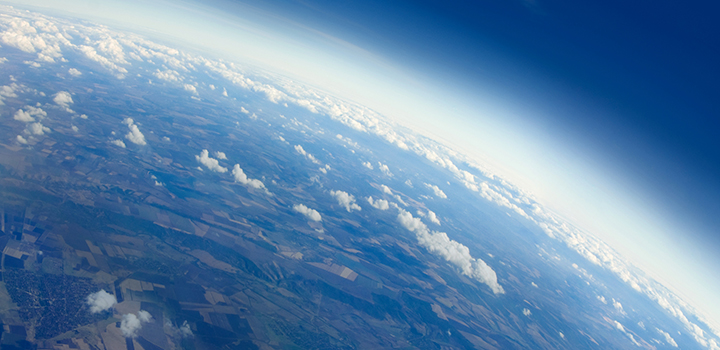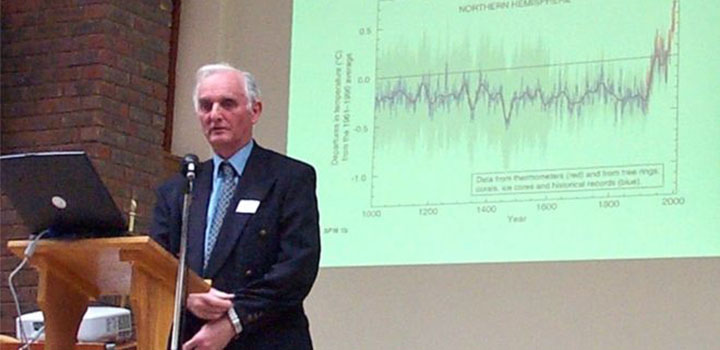Study of Earth's stratosphere reduces uncertainty in future climate change
By: Communications

New research led by the University of East Anglia (UEA) reduces uncertainty in future climate change linked to the stratosphere, with important implications for life on Earth.
Man-made climate change is one of the greatest challenges facing us today, but uncertainty in the exact magnitude of global change hampers effective policy responses.
A significant source of uncertainty relates to future changes to water vapour in the stratosphere, an extremely dry region of the atmosphere 15–50 km above the Earth’s surface.
Future increases in water vapour here risk amplifying climate change and slowing down the recovery of the ozone layer, which protects life on Earth from harmful solar ultraviolet radiation.
Now an international team led by Peer Nowack, until recently a member of the Climatic Research Unit at UEA, has developed a new statistical learning approach that combines information from satellite observations with state-of-the-art climate model data to narrow the range of likely future stratospheric water vapour amounts.
One of the key results, published today in the journal Nature Geoscience, effectively rules out the most extreme scenarios, which imply that water vapour concentrations could increase by more than 25% per degree of global warming. The new approach represents a 50% reduction in the 95th percentile of climate model responses.
“Man-made climate change affects Earth’s atmosphere in many important and often surprising ways,” said Prof Nowack, now at the Institute of Theoretical Informatics at the Karlsruhe Institute of Technology, Germany.
“In our paper, we look at changes in stratospheric water vapour under global warming, an effect that is still poorly understood. Since water vapour is central to the physics and chemistry of the stratosphere, I felt that we crucially need a new approach to address this longstanding uncertainty factor.
“With our new data-driven approach, which exploits machine learning ideas, we were able to make highly effective use of Earth observations to reduce this uncertainty. This required us to develop a framework in which we could combine scientific understanding and mathematical relationships learned from satellite data in innovative ways.”
“With this approach, we were able to show that many climate model projections of very large stratospheric water vapour changes are now inconsistent with observational evidence,” said co-author Dr Sean Davis, a Research Scientist at the National Oceanic and Atmospheric Administration in the US, specializing in satellite measurements of stratospheric water vapour.
Quantifying stratospheric water vapour trends under global warming is a longstanding research challenge. The complexity of the underlying processes that control stratospheric water vapour and the relatively short record of high-quality satellite observations has made this task difficult.
The presence of so-called climate feedbacks presents an additional challenge, as these can act to further amplify or dampen global warming, therefore leading to a wider range of possible future temperature increases.
The amount of water vapour that the stratosphere holds is an example of one such feedback, which climate models have predicted to increase, but the range of modelled increases has remained very wide for decades.
This is important, because large climate-driven increases in stratospheric water vapour, like those projected by many climate models, could delay the recovery of the ozone layer and of the Antarctic ozone hole over the course of this century.
However, Manoj Joshi, Professor of Climate Dynamics at UEA and a co-author on the paper, said: “Our research implies that while stratospheric water vapour concentrations are still likely to increase with global warming, the large changes that could substantially delay ozone recovery are highly unlikely.”
The research was funded by the UK Natural Environment Research Council (NERC) through the ML4CLOUDS project.
‘Response of stratospheric water vapour to warming constrained by satellite observations’, Peer Nowack et al, is published in Nature Geoscience on 26th June, 2023.
Related Articles

Global satellite data shows clouds will amplify global heating
A new approach to analyse satellite measurements of Earths cloud cover reveals that clouds are very likely to enhance global heating, according to a new research led by the University of East Anglia (UEA).
Read more
2020 ends earth’s warmest 10 years on record
The latest data confirms 2020 concludes the earths warmest 10-year period on record.
Read more
Influential climate scientist passes away
UEA honorary graduate Sir John Houghton, who played an influential role in international climate research, has passed away.
Read more